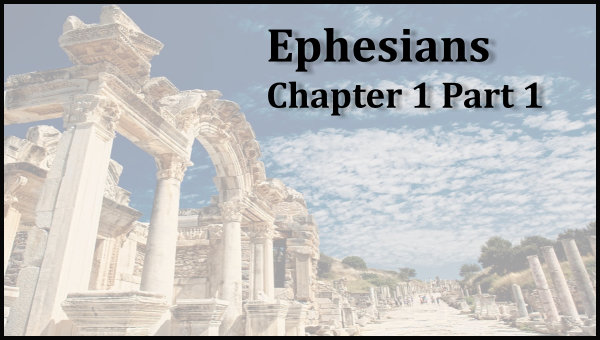By Tyson Thorne

I’ve always enjoyed this particular epistle. So much so that when my college professor for an advanced Greek reading course asked me to choose a book to translate that summer, I picked this particular letter. He grinned widely and I knew I must have made a mistake. “Should I choose something else?” I asked. “No no,” he said with an innocent face. “It’s a great choice. Come back next week with Chapter one translated.” His devilish smirk had a reason. What I didn’t know, couldn’t know until I looked at it, is that all of chapter one is a single sentence. Yep, one long run-on sentence which makes translating it particularly difficult.
For this reason it is important to understand the general idea that Paul is communicating before looking at it verse-by verse. Following his salutation in the first two verses Paul begins a line of reasoning that can cause a lot of needless debate. He introduces the concept of predestination in verse five, a concept much debated in theological circles. I call it “needless debate” because in this context the word doesn’t intone what many assume it does. The key to understanding the passage lies in paying close attention to whom Paul is discussing and whom he is speaking to.
Simply put, when Paul uses words like “us” and “we” he is speaking about Jews, and when he uses “you” later in verse 13 he is addressing Gentiles. Understanding this simple truth unlocks the meaning of the entire passage and eliminates any need for debate about the word “predestination”. Let us turn to looking at the verses now to uncover Paul’s teaching.
“For he [God] chose us [Jews] before the foundation of the world that we may be holy and unblemished in his site in love”. The Old Testament tells us that God chose Israel to be a holy nation, distinct from other others as God was their king. The Jews were to mediate between God and the other nations, teaching them about God and the coming Messiah. This covenant was first revealed to Abraham, but here we see that this was part of God’s plan from the time he laid the Earth’s foundation.
“He [God] did this by predestining us [Israel] to adoption as his sons the Jesus Christ [Messiah]”. Due to Greek syntax we can determine that this use of the term “predestination” is not likely a singling out of certain individuals based on God’s choosing, but rather a more instrumental choosing of a group. To put it another way, here “predestination” does not refer to salvation but rather to service. So God chose the nation of Israel to serve in the capacity of mediator so that they, and the nations of the world could become as adopted sons of God through the promised Messiah.
“In him [Messiah] we [Jews] have redemption through his blood, the forgiveness of our trespasses”. The secret that was revealed to Israel is that it has always been God’s intention for all things in heaven and on earth to be under the authority of the Messiah. Jews were “the first to believe” since they were predestined to serve God’s purpose by taking the teaching of God to the nations. Which brings us to the Gentiles.
“And when you [Gentiles] heard the word of truth (the gospel of your salvation) – when you believed in Christ [Messiah] – you were marked with the seal of the promised Holy Spirit, who is the down payment of our inheritance, until the redemption of God’s possession”. Paul tells us that when Gentiles put their faith in Messiah they become a part of the kingdom that God is establishing. This fits with Paul’s teaching in chapter two where he discussed God removing the distinction between Jews and Gentiles to create on new race. But we’re getting ahead of things. Tomorrow we will continue our study of chapter one.
|
|
